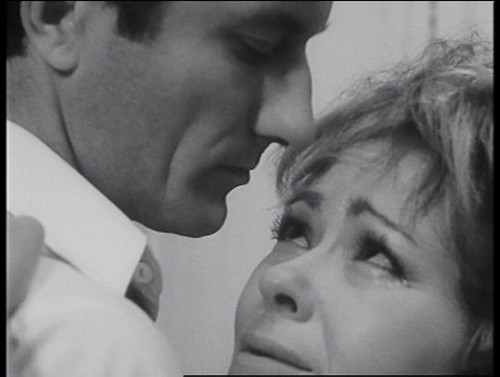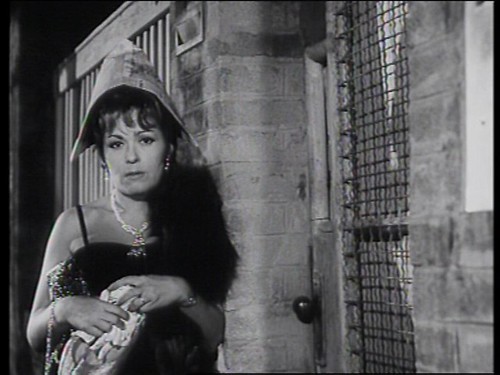Ucho (The Ear) * * *
 1970, Czechoslovakia. A man and his wife are returning home after a late party. They discover that neither has the house keys. They argue. He finally climbs over the garden wall and breaks into the house. What begins as an irritating hassle, evolves into a story of suspicion and panic when they realize that someone has been in the house. Flashbacks to the social gathering earlier that evening piece together the reason for the panic. The man is a high level member of the Communist party. His boss, a minister, had been arrested that very evening by the secret police; a victim of the 'shoot the messenger' reaction when he turned in his report on brickyard closures. As for the couple, while the panic sets in, a picture emerges of a family living precariously in the peak of communist luxury(*) but in an atmosphere of fear within a political world that capriciously promotes people, or strikes them down at will. They assume as a given that their house is bugged and refer often to "The Ear" --
1970, Czechoslovakia. A man and his wife are returning home after a late party. They discover that neither has the house keys. They argue. He finally climbs over the garden wall and breaks into the house. What begins as an irritating hassle, evolves into a story of suspicion and panic when they realize that someone has been in the house. Flashbacks to the social gathering earlier that evening piece together the reason for the panic. The man is a high level member of the Communist party. His boss, a minister, had been arrested that very evening by the secret police; a victim of the 'shoot the messenger' reaction when he turned in his report on brickyard closures. As for the couple, while the panic sets in, a picture emerges of a family living precariously in the peak of communist luxury(*) but in an atmosphere of fear within a political world that capriciously promotes people, or strikes them down at will. They assume as a given that their house is bugged and refer often to "The Ear" --  they argue in the bathroom where they can turn on the water and make love on the floor in the kitchen which they calculate is less likely to be bugged than their bedroom. The movie is the story of one psychologically harrowing night, combined with flashbacks to key conversations at the earlier social gathering, as the man tries to sort out what's happening and whether he to is to be picked up and dragged away. Random memories of remarks and incidents become full of meaning and foreboding. Claustrophobic uncertainty builds throughout the movie, and film eventually culminates in an unexpected twist.
they argue in the bathroom where they can turn on the water and make love on the floor in the kitchen which they calculate is less likely to be bugged than their bedroom. The movie is the story of one psychologically harrowing night, combined with flashbacks to key conversations at the earlier social gathering, as the man tries to sort out what's happening and whether he to is to be picked up and dragged away. Random memories of remarks and incidents become full of meaning and foreboding. Claustrophobic uncertainty builds throughout the movie, and film eventually culminates in an unexpected twist.Behind the Iron Curtain during the Cold War years, moviemaking like all of media was heavily censored by The State. Thus there are few films about the realities of life in the Soviet-controlled socialist countries -- for the obvious reason that within the Eastern bloc, such films could not be made, and outside the Eastern bloc, such topics would not be marketable. But during the 1960s in Czechoslovakia, the director/writer team of Karel Kachyna/Jan Prochazka started making films that pushed the boundaries of what was allowable. They made films that were pessimistic when films had to be optimistic by strict party demands. They followed characters that were not supposed to even exist in socialist Czechoslovakia, such as prostitutes and alcoholics. They told stories involving the dark side of agricultural collectivism and even of WWII partisans. Many of their films were banned upon release. But the miraculous fact that these films were allowed to be completed at all was not so much the result of the easing of the political climate in the mid-1960s, but rather of the fact that ironically Jan Prochazka was an influential member of the Central Committee of the Communist Party. He even became a confidante of sorts for the back-then Czechoslovak president Antonin Novotny, in the latter's difficult relations with the rising guild of Czech writers and filmmakers. During the last of 1960s, many reformers like Prochazka had moved upwards in the levels of Czechoslovak society, within and without the Communist Party, and it even seems that the 1968 reform era of Prague Sprign owes in part its existence to Jan Prochazka.
In Ucho, Kachyna/Prochazka point the lens straight at the Communist Party and its leaders. Party members are generally scheming ambitious bullies and the few true idealists who spout about 'socialist principles' seem to be bitter caricatures. The president of the country and the head of its Communist Party is a scary combination of power and stupidity. At one point he says, "Sometimes I even think to myself: 'I don't know anything about any of this.' But then I think: 'I need to make a decision; we can not defeat imperialism by being indecisive.' So I make the decision. And you know, I then tell myself: 'You made a good decision!'" The audience nods and smiles vigorously, 'Comrade is such a good leader!'. Indeed, this film is so scathing towards the Communist Party that it seems unlikely it would have been allowed even in the thawing climate of early 1968.
But this movie was not made in 1968. It was made in 1969/1970 after the Prague Spring was crushed by the "Armies of the Brotherly Nations" (the Warsaw Pact) to protect Czech socialism from counter-revolution. In the aftermath, the Communist Party was purged of reformers -- such as Prochazka. This film is the story of one night during which one of these reform-minded ministers (the man's boss) is purged. "The Ear" was immediately banned on it's release, and Jan Prochazka was banned from further work and died a year later. After his death, use of his unfilmed screenplays was forbidden. "The Ear" was released 20 years later in 1989, after the Velvet Revolution overthrew communism in Czechoslovakia. It stands as a true insider's view of the Community Party behind the Iron Curtain and the associated 'priviledged' life of those as the top of it.
(*) Life for regular people (meaning not in the communist elite) was very spartan behind the Iron Curtain. The shelves in grocery stores were invariably bare. To Western eyes, the life of this couple will appear average middle class. But to Czechoslovaks in 1970, the luxuries that are seen in the film -- roast beef, commercial liquers rather than the homegrown slivovice -- would have been unheard of and not to mention galling.
Rented from Scarecrow Video.
My epinions review of Ucho.
Labels: communist era, Czech, post-war

<< Home